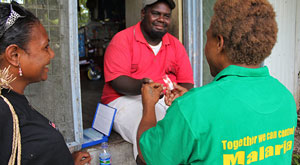Despite huge progress in the last decade in global malaria control, there are still more than 200 million malaria cases and an estimated 655,000 deaths throughout the world each year according to the World Health Organization (WHO).
Malaria causes enormous human suffering and is potentially deadly if untreated, particularly for pregnant women and children. People living in the poorest countries are the most vulnerable. The disease curtails economic and social development and puts a strain on weak and under-resourced health systems. Malaria denies children a better education and prevents poor people from earning enough to survive.
On World Malaria Day, 25 April, AusAID can reflect on the progress we have made to combat this disease by working with neighbouring governments and communities in the Asia–Pacific region.
AusAID's support to the national malaria programs in Solomon Islands and Vanuatu has seen a significant reduction in the rate of infection. We have contributed more than $25 million to support the Ministries of Health in both countries deliver their national malaria action plans.
With our support, malaria cases in Vanuatu have reduced from around 74 cases per 1000 people in 2003 to less than 26 cases per 1000 people today. The Ministry of Health is working to wipe out the disease completely from the province of Tafea, where the prevalence rate is now only 0.05 per cent of the provincial population. Results in Solomon Islands are also impressive, with a reduction in cases from 199 per 1000 people in 2003 to less than 50 cases per 1000 people today.
Dr Daniel Leavitt, a Canadian doctor with the Victoria–Vanuatu Physician Project, recently returned to Vanuatu's Tafea province after a three-year absence.
'I was so excited and amazed to return to Tanna Island and not be faced each day with patients sick with malaria….[In 2008] we were routinely having to deal with deaths in the children's ward, particularly…Wow. I can't believe it.'
The Australian aid program's support for efforts to control and eradicate malaria is achieving significant results. But there is still much to be done.
The emergence of drug-resistant malaria in the Greater Mekong Sub-Region threatens global gains in malaria control and elimination. Today in Bangkok, AusAID representatives are meeting with partner governments, WHO and others to increase the profile of this urgent issue as well as highlighting the need for increased resources, effort and coordination to combat this emerging threat.
More information
AusAID's support to malaria programs in our region
World Malaria Day 2012 (external website)

